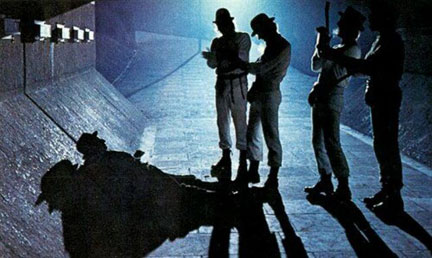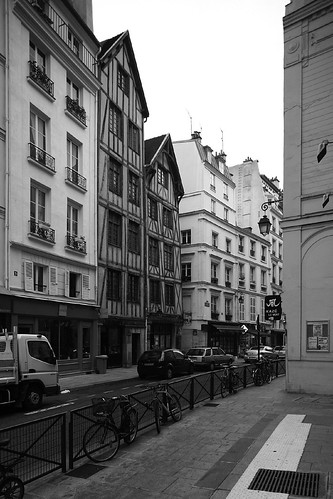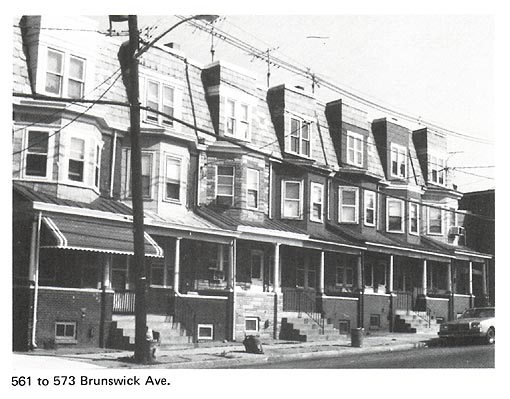Miscellanies (Mostly British)I do not write much about the unpromising-looking global economic situation because the subject is so thoroughly covered elsewhere, but I have started to notice some unsettling signs, the most telling one being that I spotted Mad Dog 20/20 and Wild Irish Rose on the shelves of the wine section in the upwardly mobile grocery store I have been going to for the last ten years for the first time ever today--and there was only one bottle of Mad Dog ($1.49) left in stock. I held off on getting it for now however.
On to real estate. This item is a month old, and may only be of interest to me, but I thought it was worth passing on to any interested buyers that
Evelyn Waugh's house--which is still owned by the family--is on sale for 2.25 million pounds. This looks liked a pretty good price to me, at least compared to say, Ray Lewis's or Shaquille O'Neal's houses as they appeared on
Cribs, both of which cost considerably more.
This book, which gets a
very good review in the Atlantic, looks like it might be worth checking out just for the photographs. My fascination with this not usually too fondly remembered (in England) time period is kind of a recurring theme on the blog. I certainly have a decided affection for many of the familiar images of it, the dinginess, the cold, the bad potato-based meals, the warm beer, the dark, greasy, steam-windowed pubs (quite a few of which, at least as late as the mid-90s, remained in apparently unaltered condition from that era, among the few living relics of that time) the spare, direct style of both the prose and poetry of the period, which I think of as having a kind of rail station elegance about it. The strong consensus now seems to be that one ought not to romanticize this era, especially from the vantage point of modern comfort and prosperity, for the Austerity age was marked by inconveniences almost unfathomable to us now--for one example the number of British households with indoor plumbing did not climb above 50% until well into the 1950s--and we should not imagine that we would ever find anything enjoyable in that similar circumstances. The photographs however do act forcefully on the mind. The impression is of a world in which a person with a decently-developed mind would have much opportunity to think--life did not appear to move with much speed or urgency in these years--and much matter to think upon (people in this era, especially educated ones, it must be pointed out in fairness, also seemed to drink far more than their counterparts do today). The other main factor in this attraction, which just came to me the other night, was that of course from 1945-1951 Britain had a socialist government, almost certainly the most stridently socialist government in its history; and I have always had a perverse, but nonetheless consistent attraction to societies in the throes of a socialist experiment, especially in its earliest phases.

My socialist sympathies go back a very long way, and no doubt have their origins in the social frustrations that have crowded out most other memories of my youth. By high school, when so many of the most desirable students, the girls in particular, were availing themselves of social options not available to me--going to dances and sporting events and concerts at other schools, or cities, or colleges, and so on, that were more exciting than what was available in our school and our neighborhood--I used to fantasize that somehow these interesting and successful kids could be trapped and forced to go to the same hangouts and social events that I went to. This is very much, I think the attitude of a socialist, especially when found in intellectuals; it is a fear of being totally abandoned and left far behind by all the best and smartest people, so that the latter practically are gone from all view. This certainly does happen. When I would be sitting in class, instead of paying attention to the lesson I would concoct ridiculous scenarios--which I am sure are not that uncommon--in which some unpredictable and sudden disaster, such as an earthquake or an aerial bombardment, would bury the school under mounds of rubble, but with me and some reasonably good-looking girl--I was not terribly picky as to whom, indeed the idea of randomness was one the more exciting aspects of the whole possibility--trapped alone, but alive, in the basement, in which the electricity and the plumbing would still be functioning, and there would also be a food supply--the home ec rooms were down there, after all, as well as a couple of vending machines. I had no illusions that the girl would let me do anything to her that I would have wished to do while there remained any hope of rescue. I figured we would have to be down there for five to ten days before she would come to the realization that I was going to be the only truelove she was ever going to have in this world, at least from this point on, and submit to me. I must say, that as a teenager the obvious option, forcible coercion, never entered my mind; I wanted my prisoner, or fellow prisoner, as it were, to fall in love with me, rather like in the story of the Beauty and the Beast, and I did not think that a clumsy attempt at violent assault was the way to bring that happy ending about. This mindset also explains I am sure my youthful nostalgia for my parents' Catholic upbringing. The most able people in this group, who were most aware of the existence of wider options, naturally found this world impossibly stifling, and when they were able to throw it off and assume important positions in society emphasized this idea of repression so much that many have come to regard "Catholic upbringing" and "repression" as synonymous. To someone who wasn't going to be doing anything that required to be repressed anyway however, the requirements of that kind of community would have served to keep some smart, exciting people close to hand at all time, people who had far more ability to make something tolerable and memorable out of a situation they had unwillingly to endure than the average person did; in the event too raising the self-worth of the other members of the group as feeling themselves members of a community with some vibrancy instead of one that shuffled about in endless and insuperable lifelessness. This at least is how it worked in my imagination.
As to my movie watching, recent weeks have seen me undergo a heavy dose of Malcolm McDowell. It was only two movies, O
Lucky Man and A
Clockwork Orange, but as they time out combined at over five hours, both offer variously unhinged and unpleasant visions of early 1970s England, and both indulge luxuriantly and exclusively on the character played by the star, the effect of watching them back to back is that one feels that he has covered this particular epoch (British film 1971-73, approx) and star pretty solidly and can color them in on his map of cultural knowledge, if you will. O
Lucky Man is not, that I can see, the great work some cinephiles claim it is, though since I had never heard of it before it offered a certain degree of unanticipated interest, which is always pleasant. It is dated, sometimes in an interesting, sometimes in a distracting way. The animating premise, widely held at the time, seems to be that society is about equal parts absurd and wicked, and even anything delightful is a surface illusion thinly covering an appalling foundation. I like the device of the road trip all around the provinces and various economic and cultural pursuits of Britain. This was a popular device in the 18th and early 19th centuries in that nation but I hadn't seen a modern update that came immediately to mind. Malcolm McDowell I must admit I kind of like, although he is exactly the type of person whose own animating premise, or one of them, seems to have been unveiled antagonism and contempt towards people like me (dull, ultimately complacent bourgeois). This is why of course he was so good for these types of movies, and why he became famous and popular in his own time He would be one of the exciting people--clever, charming, good-looking, not ridiculously so but enough to distinguish him from almost everybody else while being at the same time enough like everybody else that they could easily identify with him--that I referred to earlier in the section on socialism.

I had seen A Clockwork Orange--or at least the first hour of it, for I had not remembered anything that happened after that point--some years ago, probably when I was in college. I hadn't "gotten" it at the time; I certainly could not adequately explain what its purpose as entertainment might be. I considered myself at the time, and still do, a fan of Stanley Kubrick's movies--they are very entertaining for people who have a sort of general, haphazard, largely autodidactic, reference-book informed education such as I do. Kubrick himself was a high school dropout but seems to have read a lot of library books, looked at pictures and objects in museums, and listened to musical recordings, and interpreted them not with the privilege and authority of the scholar/expert but with that of the bohemian/artist. A Clockwork Orange is not, I am guessing, a movie of the sort that this director imagined in 1960 he would ever be making; that is one regard in which it is interesting, for I suspect most people in the arts have some vision of what forms their life's work is likely to take, ten years into the future anyway, and of very specific projects that they hope to complete. There are numerous demonstrations of course of filmmaking prowess that even I could appreciate. Having so many scenes of shocking violence and depravity follow in rapid succession right at the beginning, to be the narrative rather than the point to which the narrative was moving was a very effective technique, as these are the most memorable scenes in the film. I have not read the book, so I don't know whether that is how the plot unfolds there too. Not having any of his characters talk like a normal person, or even like ordinary affected actors, is something of a Kubrick tradmark which I am sure has been commented upon elsewhere. It is one of the secrets of his success I think, in tandem with other things, but the constant exaggeration and distortion of human speech serves to draw one into the psychic atmosphere of the movie and out of that of life. The depictions of sexual violence and rape offer a number of quite disturbing challenges to me. One of the effects of them is to be reminded of classical paintings and sculptures, of the rape of the Sabines, or of Europa, which Stanley Kubrick doubtless saw in many variations in museums and books, translated to modernity and its action developed in celluloid instead of the imagination inspired by marble. The second is to be reminded how relentless sexual pressure is on desirable young women as to constitute in many instances the primary issue of their lives, (and how in my own life I have applied approximately none of it) and how much indeed of the story of the whole world revolves around this kind of rape and violence which to others--to me--is just wholly foreign. I can't imagine what else he is trying to get at by showing it as he does.
When I finished this movie, which so reveled in its relentless depravity, and the Gene Kelly version of "Singing in the Rain" came on over the final credits I was once again impressed by the slickness of the director--if I am sitting in the theater I am thinking I guess I don't want to throw myself off a rooftop now--artifacts of optimism and innocent gaiety still exist--or am I supposed to be laughing wickedly while looking for some weakling to kick in the teeth? Are we supposed to be happy that the world turned in such a strange direction that this movie could come into existence, or oughtn't we to be happy? Does Stanley Kubrick believe in moral value, or only artistic value? Do I?
 He refers to his presence--his presence as a generic black man--as occasioning a war in the American soul. The very raw fury and violence that American whites used to unleash against black people--and I know many people argue that this attitude persists effectually unchanged today, but I have to think some of the really nasty edge at least has to have been taken off--does indicate to that something very like this was happening. Though the American soul may be calmer now, it is not quite easy; every major episode and character from mainstream American history or the arts has a racial backstory in it somewhere which is usually embarrassing, and frequently appalling, to the modern sensibility, and even if one shrinks to lay it bare, the more one is aware it is there the harder it becomes to ignore it completely. With regard to black Americans he notes how their "past was taken...almost literally, at one blow. One wonders what on earth the first slave found to say to the first dark child he bore...It was his necessity, in the words of E. Franklin Frazier, to find a 'motive for living under American culture or die.'"
He refers to his presence--his presence as a generic black man--as occasioning a war in the American soul. The very raw fury and violence that American whites used to unleash against black people--and I know many people argue that this attitude persists effectually unchanged today, but I have to think some of the really nasty edge at least has to have been taken off--does indicate to that something very like this was happening. Though the American soul may be calmer now, it is not quite easy; every major episode and character from mainstream American history or the arts has a racial backstory in it somewhere which is usually embarrassing, and frequently appalling, to the modern sensibility, and even if one shrinks to lay it bare, the more one is aware it is there the harder it becomes to ignore it completely. With regard to black Americans he notes how their "past was taken...almost literally, at one blow. One wonders what on earth the first slave found to say to the first dark child he bore...It was his necessity, in the words of E. Franklin Frazier, to find a 'motive for living under American culture or die.'" "American white men still nourish the illusion that there is some means of recovering the European innocence, of returning to a state in which black men do not exist...the American vision of the world--which allows so little reality, generally speaking, for any of the darker forces in human life..." I think the first part of this is still true to a surprisingly large extent. The second has been frequently observed by people from cultures which have suffered greatly within living memory and consider that language, the arts, love, all of the alert areas of life are experienced by them more seriously, meaningfully and intensely than they are by generic Americans. I am also pretty sure however that this ability to maintain a kind of blissful ignorance of the "darker forces in human life" was in great part what enabled America to ascend so spectacularly on the world scene as it did. That has doubtless been the source of its historically extraordinary attractiveness, as well as its energy, however maddening this is to philosophers and other people who know better what is really going on.
"American white men still nourish the illusion that there is some means of recovering the European innocence, of returning to a state in which black men do not exist...the American vision of the world--which allows so little reality, generally speaking, for any of the darker forces in human life..." I think the first part of this is still true to a surprisingly large extent. The second has been frequently observed by people from cultures which have suffered greatly within living memory and consider that language, the arts, love, all of the alert areas of life are experienced by them more seriously, meaningfully and intensely than they are by generic Americans. I am also pretty sure however that this ability to maintain a kind of blissful ignorance of the "darker forces in human life" was in great part what enabled America to ascend so spectacularly on the world scene as it did. That has doubtless been the source of its historically extraordinary attractiveness, as well as its energy, however maddening this is to philosophers and other people who know better what is really going on. 


.jpg)



.jpg)



